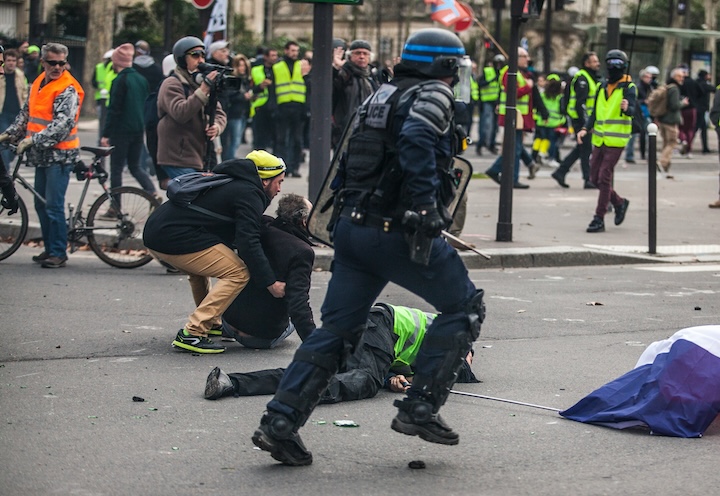How Do We End the Cycle of Violence?
by CAPP-USA
Not a day has passed recently without a headline of heartbreak: the assassination of Charlie Kirk, another horrific school shooting, and the murder of a young Ukrainian woman.
These tragedies are not isolated. They are the latest reminders of a cycle of violence gripping our nation—a cycle we have become accustomed to watching unfold in real time, though hopefully never reconciled to.

The cycle of violence worsens because we are alienated from God and each other.
It feels as if we have reached what Pope Benedict XVI warned of: “a degree of violence that knows no bounds.” (Address at the Meeting for Peace in Assisi)
We cannot turn away. We must ask with urgency:
What will finally end the cycle of violence?
Why Violence Always Fails
“The Church has spoken with one voice: violence never brings peace.
“[P]eace cannot be established by violence”. (Pope St. John Paul II)
“Christianity is decisively opposed…to promoting or provoking violence”. (Pope St. John Paul II)
“[V]iolence is evil…unacceptable as a solution to problems”. (Pope St. John Paul II)
“Violence destroys what it claims to defend: the dignity, the life, the freedom of human beings.” (Pope St. John Paul II)
“Violence is incompatible with the nature of God and the nature of the soul.” (Pope Benedict XVI)
“We must not…seek greater justice through violent means.” (Pope Leo XIV)
“Violence is not overcome by violence.” (Pope Benedict XVI)
In short, “No to violence!” (Pope Francis)
Violence is not just ineffective. It is a lie—promising protection while leaving only destruction.
When We Forget God, Violence Follows
Why does violence erupt again and again in our society?
The Church points to a deeper cause: the “denial of God”. (Pope Benedict XVI)
The “denial of God has led to much cruelty and to a degree of violence that knows no bounds…when man no longer recognizes any criterion or any judge above himself, now having only himself to take as a criterion”. (Pope Benedict XVI)
“Modern societies are characterized by increasing fragmentation and alienation.” (Pope St. John Paul II)
“Hatred, indifference and selfishness can reign in our hearts.” (Pope Francis, 59)
Violence can erupt “from within, for the sake of pursuing private interests and advantage”. (Pope Francis)
It is “the explosion of a blind energy that degrades the person”. (Pope St. Paul VI)
“We need to eliminate the roots of violence: greed, envy and, above all, resentment.” (Pope Francis)
Violence is not just a social problem. It is a spiritual problem—born of alienation from God, from one another, and even from ourselves.
How Hatred Feeds the Cycle of Violence
Once unleashed, violence reproduces itself.
“All who draw the sword will die by the sword.” (Mt. 26:42)
“Hate begets hate; violence begets violence”. (Dr. Martin Luther King Jr.)
“Violence leads to revolution, and revolution to the loss of freedom…violence concludes its cycle against itself and against the motives that provoked its intervention.” (Pope St. Paul VI)
“Violence is added to violence…each one inheriting the hatred which divided those that went before.” (Pope St. John Paul II, 4)
In our time, violence has become a “structure of sin”—fueled by alienation from God, breakdown of the family, the removal of religion from public life, deteriorating mental health, neglect of the poor, and even the justification of other forms of violence such as abortion and racism.
The cycle of violence is “the fruit of many sins”. (Pope St. John Paul II, 37)
The Only Path Out: A Return to Christ
No political program or social reform will end the cycle of violence. Only faith and trust in Christ can.
“[B]y entrusting ourselves together to the heart of Christ, ‘over the ruins accumulated by hatred and violence…the Kingdom of the heart of Christ can be built.’” (Pope Francis, 182, citing St. John Paul II)
The “‘structures of sin’…can be overcome only through the exercise of the human and Christian solidarity to which the Church calls us and which she tirelessly promotes.” (Pope St. John Paul II, 40)
“Each of us can and must become a peacemaker [and] be able to renounce their own interests in order to achieve the greater good: peace.” (Pope Francis)
“The shattered order cannot be fully restored except by a response that combines justice with forgiveness.” (Pope St. John Paul II, 2)
“Peace is a gift of God.” (Pope Benedict XVI)
Peace Is God’s Gift—If We Will Receive It
If we do not believe in God, how can we receive His gift of peace?
Only Christ breaks the cycle of violence. Only in Him do we find peace:
“It is precisely ‘the blood of Christ…that creates peace, not the blood which I spill’”. (Pope Francis)
A Prayer for Peace and Conversion
“Father, have mercy on us! Console the victims and those who suffer. May he convert the hearts of those who carry out brutal atrocities, which bring shame upon all humanity!” (Pope Francis)





